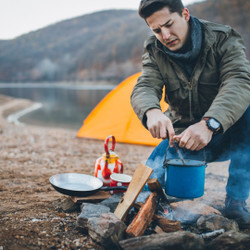Survival Skills for Winter Emergencies: Essential Gear & Tips
Posted by Amer Hatoum on Nov 15th 2024
Survival Skills for Winter Emergencies
Preparing for winter emergencies is crucial, especially when unpredictable weather or power outages strike. Cold weather survival skills are valuable for everyone, whether you live in a region prone to severe winter storms or enjoy outdoor winter activities. Here’s an in-depth guide on winter survival essentials and tips, featuring the best gear to keep on hand for safety and comfort during emergencies.
Understanding Winter Emergency Preparedness
Preparing for winter emergencies means understanding the unique challenges posed by cold temperatures, snow, and ice. Unlike other emergencies, winter storms can cut off access to roads, freeze power lines, and leave you stranded without essentials. Knowing which supplies to keep in your car, home, or backpack—and how to use them—is a critical first step in winter emergency preparedness.
Winter Survival Skills: Essential Tips
Survival in cold conditions depends on specific skills that help conserve warmth, water, and energy. Here are some fundamental winter survival skills that everyone should know.
Staying Warm in Cold Conditions
The human body loses heat quickly in freezing temperatures, so retaining body warmth is crucial. Here are a few strategies:
- Layer Up: Wear insulated layers, including thermal base layers, sweaters, and a wind-resistant outer shell.
- Stay Dry: Wet clothing drastically reduces warmth. Keep extra dry clothing, socks, and waterproof outer layers on hand.
- Cover Extremities: Wear hats, gloves, and scarves to prevent heat loss through the head, hands, and neck.
- Insulate Sleeping and Sitting Areas: If sleeping outdoors, use a sleeping bag rated for low temperatures and insulation like a foam pad or poncho liner.
Ensuring Safe Hydration
Even in cold conditions, staying hydrated is essential. Dehydration can sneak up during winter as cold temperatures reduce your thirst.
- Melt Snow Safely: Snow can be a source of water if boiled or treated. Use a canteen cup or a portable stove to melt and purify it.
- Avoid Eating Snow Directly: Eating snow directly reduces body temperature, so always melt it before drinking.
- Keep Water from Freezing: Use insulated carriers or bury canteens to prevent freezing. Hydration packs with insulated tubing can be useful for outdoor activities.
Building Shelter in Snowy or Icy Conditions
Having an emergency shelter is vital if you're stranded outdoors.
- Use Natural Elements: Build a snow cave or lean-to if you’re in a wooded area, using fallen branches and tarps.
- Ponchos & Blankets: Carry a military poncho and emergency blankets to construct a wind-resistant shelter.
- Create Insulated Spaces: Layer the ground with leaves or a tarp to prevent heat loss from below.
Maintaining Communication and Light
In a winter emergency, access to light and communication can be life-saving.
- Flashlights and Headlamps: Keep LED flashlights or headlamps with extra batteries in your pack.
- Emergency Radios: A hand-crank or battery-operated radio helps you stay updated on weather changes and safety alerts.
- Phone Power Banks: Store power banks to charge your phone in case of prolonged power outages.
Top Survival Gear for Winter Emergencies
Equipping yourself with reliable survival gear ensures you’re prepared for almost any winter emergency. Here are key items that are must-haves for winter survival.
Insulated Clothing and Layers
Wearing multiple, moisture-wicking layers is essential. Items like thermal socks, tactical gloves, and water-resistant jackets offer needed warmth in severe conditions. Consider fleece-lined hats and balaclavas to protect exposed skin, especially if you’re outside for prolonged periods.
Fire Starting Kits and Tools
In cold environments, starting a fire is crucial for warmth and cooking.
- Fire Starters and Lighters: Keep waterproof matches, magnesium fire starters, and a lighter in your kit.
- Portable Stoves: A compact stove is essential for melting snow, cooking, and boiling water, which can also improve morale in harsh conditions.
Portable Cooking and Food Supplies
Easy-to-carry, high-calorie food is essential when energy demands are high in cold temperatures.
- MREs (Meals Ready-to-Eat): High in calories and protein, MREs are easy to prepare and nutrient-dense, making them a great choice for winter emergencies.
- Canteens and Mess Kits: Durable canteens and cooking mess kits help you cook, melt snow, and store water safely.
- Snacks and Hydration: Carry protein bars, trail mix, and electrolytes to maintain energy levels.
First Aid and Emergency Kits
Having a well-equipped first-aid kit is a must for winter emergencies, as icy conditions can lead to injuries.
- Basic Medical Supplies: Bandages, antiseptics, and gauze are essential for treating cuts and scrapes.
- Trauma Supplies: Include trauma bandages and a tourniquet in case of severe injuries, especially in outdoor settings.
- Hand Warmers: Chemical hand warmers can help stave off frostbite in freezing conditions.
Final Tips for Staying Prepared
Winter emergencies can be dangerous, but having the right gear and knowledge makes a huge difference. Keep your survival kit up-to-date, with fresh batteries, extra blankets, and regularly rotated food supplies. Practicing how to use your gear can also give you peace of mind that you're prepared if an emergency strikes.
Staying calm and following safety protocols will help you and your loved ones stay safe during winter emergencies. Proper preparation ensures that you’ll have the tools and skills to make it through cold-weather challenges safely and comfortably.
